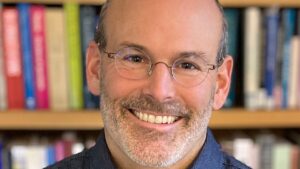
Breaking the Cycle of Food Cravings (Archive)
This week, our guest is renowned addiction psychiatrist Jud Brewer. He teaches at Brown University in both the School of Public Health and the Medical School, and he has developed programs that utilize mindfulness to help us figure out why we overeat, get hooked on social media or drink too much. His approach has helped countless people break their own bad habits, whether it’s smoking or giving in to food cravings.
You may want to listen to this rebroadcast through your local public radio station or get the live stream at 7 am EDT on your computer or smart phone (wunc.org). Here is a link so you can find which stations carry our broadcast. If you can’t listen to the broadcast, you may wish to hear the podcast later. You can subscribe through your favorite podcast provider, download the mp3 using the link at the bottom of the page, or listen to the stream on this post starting on September 2, 2024.
The Siren Song of M&Ms:
Have you ever come to the bottom of a bag of potato chips and wondered where they all went? How could they have disappeared so quickly? After all, you weren’t actually inhaling them.
Or perhaps the empty bag in your hand once held M&Ms. Plenty of foods have been carefully designed to hit the bliss point–a nearly irresistible combination of sugar, salt and fat. As a result, we may frequently find ourselves munching on something when we aren’t even hungry. Instead, we are eating from habit.
How Habits Begin:
Habits are not unique to humans. Even sea slugs develop habits, because they save effort and require fewer decisions. The habit starts when the organism (that could be you) notices a cue or trigger. They then try a behavior to manage that trigger, and if the result is useful in some way, we can call it a reward. That’s how it works. However, you may have noticed that some habits are helpful and some (like the M&M munching habit) are less beneficial. Sometimes a habit may start off as helpful but get applied more widely so that it is now more of a hindrance.
The Cycle of Food Cravings:
Dr. Jud Brewer points out that we have to eat in order to survive. So if we are feeling anxious because we are hungry, and we find some M&Ms and eat them, the reward is that we no longer feel hungry. The danger is that we begin to associate M&M eating behavior with alleviating an anxious feeling. That’s one way food cravings can get started and set us on a path of eating even though we are not hungry. Unless we pay attention, we may even forget exactly how we feel when we are hungry.
Willpower as a Myth:
Lots of us have heard that all you need to deal with food cravings is willpower. Many people believe that, but it turns out willpower doesn’t really work. Moreover, if we give in to food cravings (because willpower doesn’t work, but we expect that it should), we may end up blaming ourselves and beating ourselves up emotionally. Feelings of shame and guilt often lead us right back to feeling bad about ourselves, which might be the trigger for food cravings and overeating behavior. You can see how easily this could set up a vicious cycle that might be tough to stop. To help us start to break these habit loops, Dr. Brewer recommends self-kindness or self-compassion instead of self-judgment.
Re-Establishing our Reward Hierarchy and Demoting Food Cravings:
One way of breaking our habit loops is to find a bigger, better reward. To do this, it helps to practice mindfulness, paying attention to how we feel as we consume whatever food-like substance has us in its grip. Slowing down, we might be able to determine if the first and second spoonfuls of ice cream make us feel good, but by the fifth spoonful the enchantment is gone. Or we might realize that after we eat a bowl of nachos, the heartburn was not worth the momentary pleasure. What behavior can we substitute that will offer a better and more lasting reward?
Accepting the Craving Monster:
Another step in breaking the cycle of food cravings is to accept the craving monster. Acknowledge the craving (I feel like eating mint chocolate chip ice cream) and explore what it feels like. Get curious about it. Cravings come and go, and if we can learn to investigate them as phenomena, we don’t have to act on them. Curiosity and kindness can help us step out of the cycle.
This Week’s Guest:
Jud Brewer, MD, PhD, is an internationally renowned addiction psychiatrist and neuroscientist. He is a professor in the School of Public Health and Medical School at Brown University. His 2016 TED Talk, “A Simple Way to Break a Bad Habit,” has been viewed more than 19 million times. He has trained Olympic athletes and coaches, government ministers, and business leaders. Dr. Brewer is the author of The Craving Mind: from cigarettes to smartphones to love, why we get hooked and how we can break bad habits, the New York Times best-seller, Unwinding Anxiety: New Science Shows How to Break the Cycles of Worry and Fear to Heal Your Mind, and his latest book is The Hunger Habit: Why We Eat When We’re Not Hungry and How to Stop.
You can find more information on the Eat Right Now app that Dr. Brewer developed at https://goeatrightnow.com or in the app store.

Jud Brewer, MD, PhD, Brown University
Listen to the Podcast:
The podcast of this program will be available Monday, September 2, 2024, after broadcast on Aug. 31. You can stream the show from this site and download the podcast for free.

